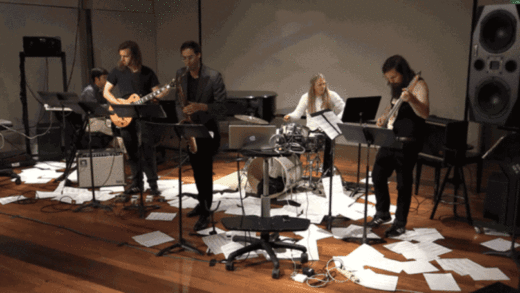What is it, then? According to its press release, Organvm Perceptvs is “a virtuosic decomposition and reconstruction of the Great American Songbook performed by a core quintet augmented by New York’s best freelance contemporary classical musicians.” In other words: Great musicians playing great songs — badly.
That’s a slightly uncharitable reading. The actual process involved in the construction of this record is a great deal more complicated — so much so, in fact, that it is accompanied by a 12-page suite of liner notes detailing the whole process. To make a long story short: David Kant, the Happy Valley Band’s “bandleader” or “composer,” designed his own home-grown computer software which algorithmically reduces pop music to its constituent parts, then transcribes those constituent parts as sheet music — so human musicians can play them.
The disjointedness and losses of translation inherent in this process are what make Organvm Perceptvs such a — “unique,” let’s say — listen. The process is a good deal more complicated than I let on here, and entails some interesting, valuable philosophical conundrums, particularly with respect to notions of authorship, authenticity, and the role of computers in music-making as music-making becomes increasingly more technologically esoteric.
https://indexical.bandcamp.com/track/its-a-mans-mans-mans-world
And yet: The resultant music is bad. Quite bad. To this listener, it is like nails on a chalkboard. (Actually, nails on a chalkboard sounds much better to me; what does it mean that I prefer pure cacophony to off-time, off-kilter pop music?) I cannot in good conscience say I will ever listen to this record again, except to play as a parlor trick or to quickly put an end to a party that’s gone on for too long. That seems its chief accomplishment; this record is awful, even exquisitely so. It is long (and rich) in ideas but woefully short in execution — by design. Whether or not that makes it worth owning — well, your mileage may vary.
The Happy Valley Band performs live with Wobbly on Wednesday, April 26 at the Center for New Music in San Francisco. Tickets ($10 – $15) and more info here.

KNXVES, “Civilized” / “Reasons Pt. 2”
(Self-released)
Last year, I received some new music in my inbox that stood out from all the rest: it was catchy, dissonant, and soulful at once, tied together by a chunky, corroded breakbeat. Called “Reasons Pt. 2,” it came courtesy of young Oakland-by-way-of-LA artist KNXVES, and it’s been bouncing around various parts of my brain since I first heard it.
https://soundcloud.com/knxves/reasons-pt2
Fast forward many months later, and a new email from KNXVES lands in my inbox: he’s released a new tune, “Civilized.” It sounds different from “Reasons Pt. 2” — it’s milder, more introspective, and less concerned with rhythm — but it’s clearly the work of the same talented artist.
KNXVES describes his music as “post-soul,” which in this world — where everything bleeds into each other and commingles without end — seems as fine a description as any. The “post-” is key: KNXVES’ music is rooted in soul, particularly apparent in the rich emotional tenor of his vocals, but he’s clearly concerned with a whole lot more. “Reasons Pt. 2” is steeped in trip-hop, the chunky breakbeat calling back to the golden days of Mo’ Wax. “Civilized” pushes farther out, all but abandoning beats altogether and incorporating glitchy vocal effects that makes the whole thing sound not unlike Oval playing with soul.
On the face of it, it seems silly to review these tunes — their combined runtime lasts hardly more than five minutes. But a YouTube video and a SoundCloud upload are the contemporary equivalent of a 7″ single, and more importantly, both of these songs are superb and leave me aching to hear more. And that, in today’s age of bombardment and profusion, is a rare feeling indeed.

Rays, Rays
(Trouble In Mind)
As someone who consumes an inordinate amount of high-falutin’, high-concept music designed to tickle the brain-stem, a certain part of me craves raw, direct, straight-to-the-vein records that make no bones about what they are or what sound they’re after: records without pretension or shame. Which is precisely what the new self-titled debut LP from Oakland-based band Rays is, and precisely why I like it so much.
https://soundcloud.com/troubleinmind/rays-theatre-of-lunacy-trouble-in-mind-records
Rays is a rock band, or a punk band, or a post-punk band. More accurately, that doesn’t really matter and isn’t the point anyway — Rays do not strike me as a band particularly concerned with identity. Across 11 songs and about 30 minutes, Rays strum guitars, slam drum skins, and sing along — sometimes out of key, sometimes not — with an energy and exuberance that few besides the adolescent, the blithe, and the blessed can match.
The vocals, dissonant as they are, were a sticking point for me at first. It’s easy to read them as lazy or careless; on my first listen-through, I was taken aback, in fact. But on my second, third, and subsequent listens, my uncertainty became acceptance and then endearment. I allowed myself to accept the rock. And this album rocks.
https://soundcloud.com/troubleinmind/rays-lost
Impressively, Rays manage to flit through a suite of styles on such a short, sweet record. The opening salvo, “Attic,” is pure, unfiltered West Coast garage rock. “Lost in a Cage” is playful, even a bit surf-y. “Pain and Sorrow” is plaintive as its name. And “Theatre of Lunacy,” my favorite tune on the record, is post-punk bliss, taking pages from the European playbook.
There’s no bullshit on this record. What you hear is what you get. Sometimes, that’s exactly what you need.
Rays performs Monday, April 17 at El Rio in San Francisco. Tickets ($5) and more info here.





